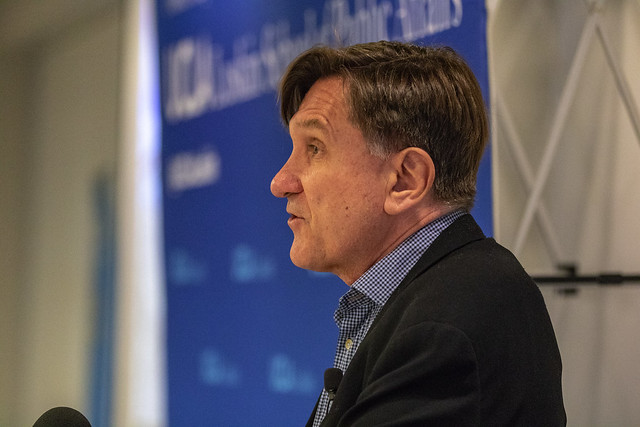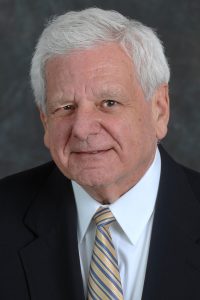By Aaron Julian
Last December, Los Angeles and the greater Southern California area faced many major fire events, including the Skirball and Thomas fires, that caused tens of millions of dollars of damage to hundreds of thousands of acres and hundreds of buildings. Severe fire incidents such as these leave an impression on some people that all wildfires can be nothing but catastrophic.
But the rich history of benefits, losses, debates, policy initiatives and research demonstrate that wildfires are so much more than what meets the eye.
Wildfire was the topic of discussion on April 19, 2018, at UCLA Luskin. Fronting this event was Edward Struzik, a fellow at the Institute for Energy and Environmental Policy at Queen’s University in Kingston, Canada, and author of the book, “Firestorm: How Wildfire Will Shape Our Future.” Struzik detailed the history, science and approaches taken to control wildfires over the past couple of centuries. He also pressed for a hybrid approach to wildfires that moves us away from the longstanding policy of fire suppression toward fire management.
“Fire rejuvenates forests by removing disease-ridden plants and harmful insects from forest ecosystems, and yet fire continues to be demonized. … The big problem is that we have not been able to figure out how to live with fire,” Struzik said.
Wildfire incidents have become increasingly powerful and widespread, he said, and in turn have become increasingly difficult to contain. This amplifying issue can be attributed to factors such as global climate change, invasive trees and shrubs, arctic sea ice changes, and, especially, human behavior. As the human population increases, communities grow and spread. As more people spend more time in forests, fire risks increase dramatically.
“Human-started wildfires have accounted for 84 percent of total wildfires, and tripled the length of the fire season,” Struzik asserted. “The problem we can say is not fire, but people.”
He added that preparation is crucial in communities that are at risk of wildfire, so that people understand that we are unable to stop all fires. He argued for improved early warning processes and clearer evacuation protocols. Struzik also proposed doing more controlled burns and allowing remote wildfires to run their course to safely deplete the fuel for these fires and enhance forest ecosystems.
The future is projected to become increasingly dangerous if fire suppression remains dominant. As arctic sea ice continues to diminish, Santa Ana winds will become dryer. Struzik says that our best option is to adapt and embrace “good fire”; otherwise, the “bad and the ugly fires” will prevail.
Following the lecture, a panel of experts expanded on the subject matter.
Doug Bevington, director of the Environment Now Forest Program at the Leonardo DiCaprio Foundation and moderator of the panel, said, “The central challenge we face is to find policies that simultaneously take climate change seriously and take the natural role of large wildfires seriously … while enabling Californians to safely coexist with wildfire as an inevitable part of life in our state.”
Chief Ralph Terrazas of the Los Angeles Fire Department detailed the hard work and strain that California fire departments have experienced in recent years, including last December when multiple fires raged at once. Terrazas emphasized the importance of larger policy reforms to reduce fire incidents and stretch fire combat resources when homes and lives are endangered.
“It is about changing the way we think when we live in these environments,” said Beth Burnham, a founder and current member of the North Topanga Safe Fire Council. Burnham argued that when people live in fire-risk areas like many parts of Southern California, they must make fire readiness and preparation a priority.
Alex Hall, a professor in the Department of Atmospheric and Oceanic Sciences and director of the Center for Climate Science at UCLA, drew on his work in climate science in adding his perspective. “In California, there is this tremendous sensitivity of fire to climate and weather. Because climate and weather are changing, that means fire is also changing,” he said.
When the conversation was opened to the crowd, topics included technical inquiries from workers in water management as well as personal anecdotes about safety in communities that have previously been impacted by fire incidents. The panel reiterated the need to be prepared and have a plan for fire incidents, but attendees were also urged to work at the community level to promote change on a wider scale.
The event was organized by the Luskin Center for Innovation as part of the UCLA Luskin Innovator Series.
Click or swipe to view a gallery of photos from the event:

 The California Council on Science and Technology (CCST) has added Albert Carnesale, UCLA chancellor emeritus and professor emeritus of public policy and mechanical and aerospace engineering to its
The California Council on Science and Technology (CCST) has added Albert Carnesale, UCLA chancellor emeritus and professor emeritus of public policy and mechanical and aerospace engineering to its 
